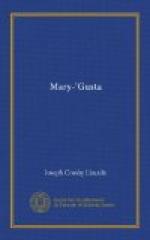To Mary-’Gusta that chair was a perpetual fascination. She had been expressly forbidden to touch it, had been shut in the dark closet more than once for touching it; but, nevertheless, the temptation was always there and she had yielded to that temptation at intervals when Mrs. Hobbs and her stepfather were out. And the last time she had touched it she had broken the catch. She had wound up the music box, after hearing it play, but the catch which made it a perfectly safe seat and not a trap for the unwary had refused to push back into place. And now there it was, loaded and primed, so to speak, and she was responsible. Suppose—Oh, horrible thought!—suppose anyone should sit in it that afternoon!
She gasped and jumped off the sofa. Then she remembered Mrs. Hobbs’ parting command and stopped, hesitating. Mr. Hallett, standing at the end of the hall, by the front door, heard her move and tiptoed to the sitting-room.
“What’s the matter, little girl?” he whispered, soothingly.
“No-nothin’,” gasped Mary-’Gusta.
“You’re sure?”
“Ye-yes, sir.”
“All right. Then you set down on the sofa and keep still. You mustn’t make any noise. The folks are comin’ now. Set right down on the sofy, that’s a good girl!”
So back to the sofa went Mary-’Gusta, trembling with apprehension. From her seat she could see along the hall and also through the other door into the “big settin’-room,” where, also, there were rows of chairs. And, to her horror, these chairs began to fill. People, most of them dressed in church-going garments which rattled and rustled, were tiptoeing in and sitting down where she could see them and they could see her. She did not dare to move now; did not dare go near the music chair even if going near it would have done any good. She remained upon the sofa, and shivered.
A few moments later Mrs. Hobbs appeared, looking very solemn and Sundayfied, and sat beside her. Then Judge and Mrs. Baxter were shown into the little room and took two of the remaining chairs. The Judge bowed and smiled and Mrs. Baxter leaned over and patted her hand. Mary-’Gusta tried to smile, too, but succeeded only in looking more miserable. Mrs. Hobbs whispered to her to sit up straight.
There was a steady stream of people through the front door now. They all entered the parlor and many stayed there, but others passed on into the “big settin’-room.” The chairs there were almost all taken; soon all were taken and Mr. Hallett was obliged to remove one of those in the small room. There were but two left empty, one a tall, straight antique with a rush seat, a family heirloom, and the other the music chair. Mary-’Gusta stared at the music chair and hoped and hoped.
Mr. Sharon, the minister, entered and shook hands with the Judge and Mrs. Baxter and with Mrs. Hobbs and Mary-’Gusta. He also patted the child’s hand. Mrs. Hobbs whispered to him, with evident pride, that it was “goin’ to be one of the biggest funerals ever given in Ostable.” Mr. Sharon nodded. Then, after waiting a moment or two, he tiptoed along the front hall and took up his stand by the parlor door. There was a final rustle of gowns, a final crackle of Sunday shirtfronts, and then a hushed silence.




